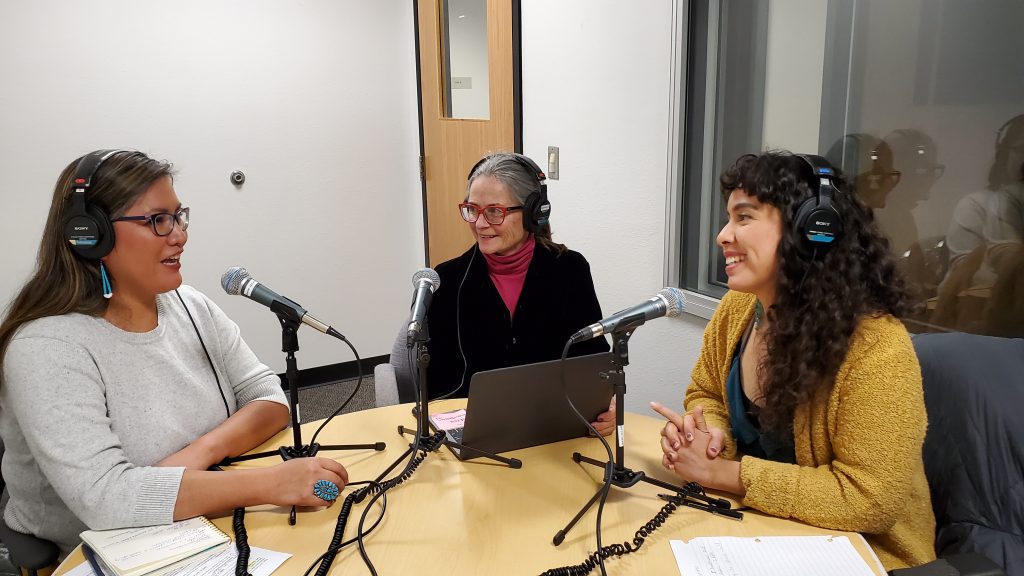Latest Fairness First episode explores advancing health equity in Arizona

What are the root causes of health inequity and how do they affect the social determinants of health?
According to the recently released 2020 Regional Health Equity Survey Report (RHES), a key component to the root causes of health equity lies in the paths that create the problem — the unequal distribution of power and resources, and the “unfair institutional policies that shape opportunities for the systematic, avoidable, unfair, and unjust differences in health status across population groups, sustained over time and generations, which are beyond the control of individuals.”
In the second of a two-part discussion, “Shared Vision for Health Equity” Fairness First podcast host Alexandra Samarron Longorio interviewed Dulce Jiménez and Mark Remiker, lead researchers in the RHES project through the Southwest Health Equity Research Collaborative (SHERC) Community Engagement Core (CEC), about their survey results.
During the interview, Jiménez describes the social determinants of health as the environment in which people are “born, live, learn work, play and age” that influence their health.
Project researchers also included Samarron Longorio; Samantha Sabo, co-lead of the SHERC CEC and associate professor in NAU’s Department of Health Sciences and NAU’s Center for Community Health and Engaged Research (CHER); Carmenlita Chief, SHERC senior research coordinator; Heather Williamson, associate professor in NAU’s Department of Occupational Therapy; and Nicolette Teufel-Shone, associate director of CHER, co-lead of the SHERC CEC, and professor in NAU’s Department of Health Sciences.
In the RHES report, researchers from SHERC’s CEC asked more than 200 community, organizational, and grassroots leaders of five northern Arizona counties — Apache, Coconino, Mohave, Navajo, and Yavapai — a series of 48 questions.
The survey covered topics related to distribution of resources in the communities served, personal understanding of the social determinants of health, organizational capacity to address health inequities, extent and focus of cross-sectoral partnerships, use of data in decision making, and the role of research in addressing health inequities in the community.
The researchers discovered that a key way to address health equity issues may exist in cross-sectoral collaboration between Arizona’s top community leaders — those whose individual work, when brought together, directly affects all aspects of creating a healthy and vibrant community through improving social, environmental or economic conditions.
Social determinants of health vs. root causes of health inequity
“A majority of people when they took the survey were describing social determinants of health, and they were often talking about them in synergy –– together with other social determinants of health describing very complex systems of disparity,” Jiménez said. “So, a lot of times, it wasn’t just that people couldn’t get jobs, it was that they also didn’t have transportation, and also their rent was too expensive.”
The researchers describe the nine areas that influence the social determinants in a community: education, employment, health systems and services, physical environment, income and wealth, housing, transportation, social environment, and public safety.
“For me, one of the things that I found was positive and interesting [in the survey results] was that there was a clear desire for leaders in the northern Arizona region to engage in collaboration, especially those multi-sectoral collaborations that we have been talking about,” Jiménez said. “Leaders actually do want to partner with other organizations and agencies in different sectors as well as the community to do health equity work together. And through the survey, we found that in a lot of cases they are already doing so.”
The researchers said that when questioned about the root causes of health inequity, respondents often confused them with the social determinants of health. People were able to identify the barrier for people in their communities being as healthy as possible but they were not able to explain why those barriers existed in the first place.
“Even within public health, people continue to confuse the social determinants of health with the root causes of health inequity,” Samarron Longorio added. “Also, the term health equity tends to be thrown here and there, but there is no deep meaning or deep understanding of how systems of injustice work in our society and leave legacies of health disparities and inequities.”
Remiker said that in the survey, the researchers found that County leaders who reported high levels of organizational capability to address health equity were associated with an increased organizational focus on the social determinants of health and that participants knowledge of the social determinants of health was predictive of the number of desired future cross-sectoral partnerships above and beyond their past partnerships.
While past partnerships were certainly important, the effect of past partnerships was attenuated when personal knowledge of social determinants of health was added to the model,” Remiker said. “This highlights the importance of educating multisectoral leaders and community members on social determinants of health when promoting future cross-sectoral partnerships to address health equity in our region.”
Samarron Longorio said that there was not just one correct way of thinking about a vision of health equity.
“One of the first steps in identifying the root causes of inequity is to move away from only being stuck in health disparities” said Samarron Longorio. “How healthy a person is or not has a deeper reason much beyond an individual’s personal responsibility to stay healthy. This deeper reason is connected to bigger structures of injustice within the social and environmental spaces we navigate every single day.”
Fairness First is available through iTunes, Spotify, Podbean, and other podcasts sources. Visit the Fairness First podcast for transcripts of each episode.
SHERC is a grant-funded initiative of the Center for Community Health and Engaged Research and is supported by funding from the National Institute on Minority Health and Health Disparities of the National Institutes of Health (U54MD012388).
